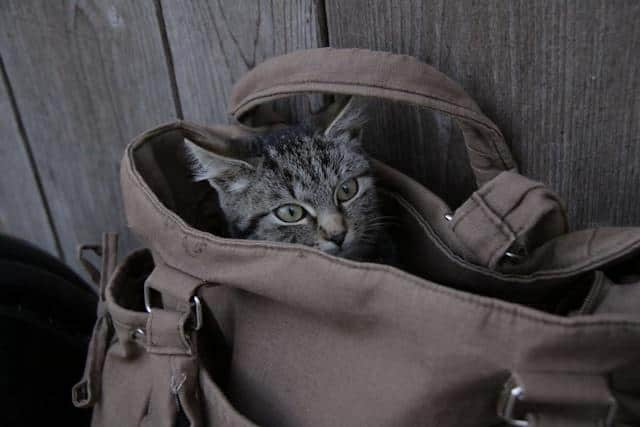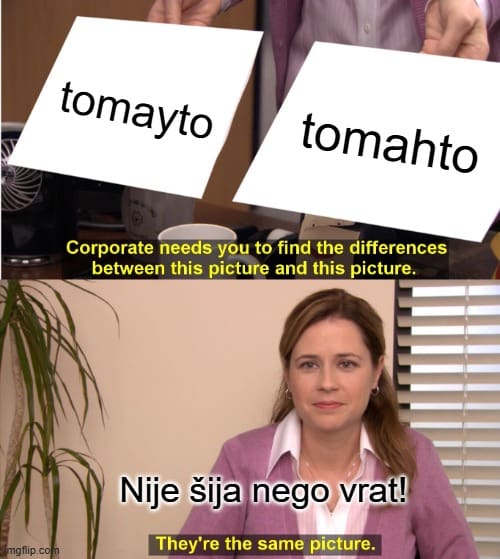Join our live online group lessons starting September 1! Sign up until August 22 here.
Days
Hours
Minutes
Join our live online group lessons starting September 1! Sign up until August 22 here.

Been studying Serbian for a while, but it still sounds like you’re reading from a textbook? Then, it’s time for Serbian idioms to join the party!
Not only will these expressions make you sound more like a native, but they’re also a fun and effortless way to level up your language skills.
Ready to take the plunge? Here are the top Serbian idioms you should start using today!
For language lovers, idioms are like treasure chests — packed with hidden meanings that make you think beyond words.
Some of these Serbian idioms have direct equivalents in English, while others are trickier to translate.
Either way, they’re a great way to boost your vocabulary and add a natural, authentic touch to your speech!
Literal translation: to buy a cat in a sack
Meaning: to buy something blindly or make a decision without having enough information
Sometimes, a deal looks golden until it’s too late. Next thing you know, you’ve bought a pig in a poke or, as Serbs would put it, a cat in a sack.
Example:
Prihvatila sam posao misleći da je super, ali prvog dana sam shvatila da sam kupila mačku u džaku.
(I accepted the job thinking it was great, but the first day, I realized I had bought a cat in a sack.)

Literal translation: to make an elephant out of a fly
Meaning: to exaggerate or blow something out of proportion
Some people have a gift for drama — one little hiccup, and suddenly, it’s a full-blown crisis. In Serbian, this is called making an elephant out of a fly, much like making a mountain out of a molehill in English.
Example:
Nemoj praviti od muve slona — nije kraj sveta ako malo kasnimo!
(Don’t make a mountain out of a molehill — it’s not the end of the world if we’re a little late!)
Literal translation: to mix grandmothers and frogs
Meaning: to compare things that are completely unrelated or incompatible
Ever tried comparing apples and oranges? In Serbian, that would be mixing grandmothers and frogs! Similar to its English equivalent, this Serbian idiom is a fun way to point out when someone compares two things with nothing in common.
Example:
Hoćeš da kažeš da je sport korisniji od umetnosti? To je kao da mešaš babe i žabe!
(You want to say that sports are more useful than art? That’s like mixing apples and oranges!)
Literal translation: to look for a needle in a haystack
Meaning: to attempt something extremely difficult or nearly impossible
Conveniently, this phrase is a carbon copy of the English idiom that involves sharp objects and stacks of dry grass.
Example:
Tražiti savršenog partnera je kao da tražiš iglu u plastu sena.
(Looking for the perfect partner is like looking for a needle in a haystack.)
Literal translation: like the sky and the earth
Meaning: completely different or incompatible
Do you know two people who are like night and day? Perhaps their personalities are polar opposites, and so are their interests. The Serbian language describes such people as the sky and earth — nebo i zemlja.
Example:
Njih dvoje su kao nebo i zemlja — ona je tiha i povučena, a on je društven i otvoren.
(Those two are like night and day — she’s quiet and reserved, while he’s social and outgoing.)
Literal translation: a thorn in the eye
Meaning: a source of annoyance or irritation
In English, it’s a thorn in your side. In Serbian, a thorn is in your eye. Either way, we’re talking about someone who gets on your nerves and causes you trouble — constantly.
Example:
Ona je bila trn u oku svim nastavnicima jer je stalno ometala časove.
(She was a thorn in the side of all the teachers because she kept interrupting the classes.)
Literal translation: to pour from the hollow into the empty
Meaning: to waste your time and effort doing something pointless
Ever tried to fix the unfixable or talk sense into the senseless? That’s what presipati iz šupljeg u prazno feels like — putting in an effort only to realize you’re going around in circles with zero results.
Example:
Bez akcije, svi ovi razgovori o promenama su samo presipanje iz šupljeg u prazno.
(Without action, all these talks about changes are just pouring from the hollow into the empty.)
Literal translation: Spanish villages
Meaning: something you don’t understand or know anything about
Do you know anything about Spanish villages? Well, even if you are an expert, most people know little about them. So, when something feels too complex or confusing — like it’s all Greek to you — this Serbian idiom captures it perfectly.
Example:
Pokušao je da mi objasni kako funkcioniše veštačka inteligencija, ali to su za mene španska sela.
(He tried to explain how artificial intelligence works, but it’s all Greek to me.)
Literal translation: to get up on the left leg
Meaning: to be in a bed mood for no particular reason
We all have those days. You wake up grumpy, not quite yourself, but nothing specific is to blame. It’s the classic case of getting up on the wrong side of the bed. In Serbia, though, people might ask if you’ve gotten up on your left leg.
Example:
Ceo dan se žali na svaku sitnicu. Definitivno je ustao na levu nogu.
(He’s been complaining about every little thing all day. He definitely woke up on the wrong side of the bed.)

Literal translation: to look for a hair in an egg
Meaning: to be nitpicking or looking for a flaw in everything
Picture this: you bake the most delicious cake, and everyone’s devouring it. But then there’s that one person who complains it’s too sweet. That’s when you can say they’re looking for a hair in an egg — basically, nitpicking over something that’s perfectly fine.
Example:
Svaki put kad biramo restoran, ona traži dlaku u jajetu — previše gužve, premalo jela u ponudi, preglasna muzika…
(Every time we’re choosing a restaurant, she nitpicks — too crowded, not enough dishes on the menu, music is too loud…)
Literal translation: It’s not the neck, it’s the throat
Meaning: It’s the same thing
Whenever you have the urge to say tomayto, tomahto, this Serbian idiom involving the neck will cover it.
Example:
A: Baš je ukusna čorba.
(This soup is really tasty.)
B: Ovo je potaž, ne čorba.
(This is potage, not soup.)
A: Nije šija nego vrat.
(Same difference.)

There you have it — 11 Serbian idioms to spice up your conversations! Of course, this is just the tip of the iceberg — Serbian is packed with quirky idioms and colorful expressions that’ll make you sound more natural.
So, what’s the best way to pick them up? Immerse yourself in the language: read books and magazines, watch movies, listen to music — whatever floats your boat. For extra support and guidance, join our online individual lessons and take your Serbian to the next level!